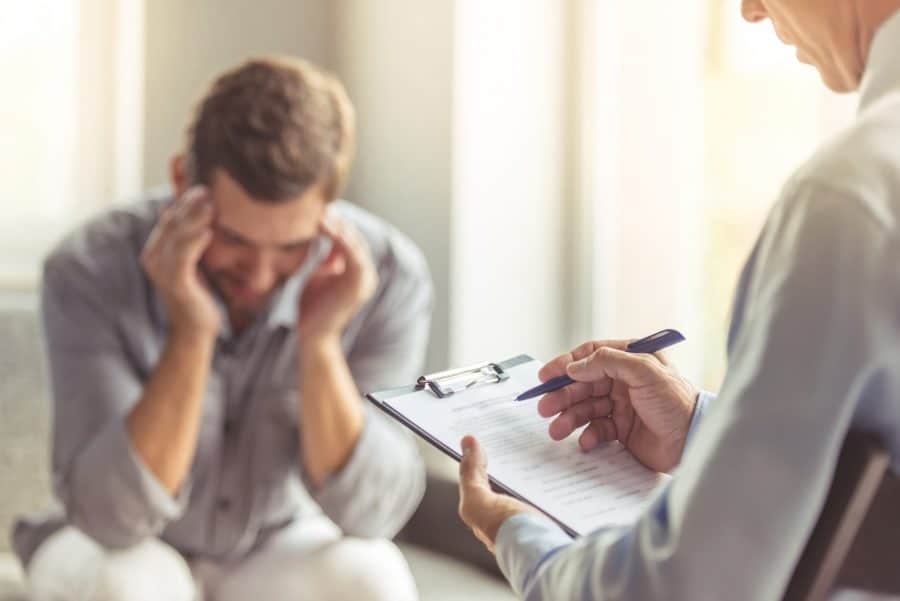Depression manifests differently in each individual. Depression feels like a profound, weighty sadness to me. It’s like a thick fog slowly creeping in and enveloping every part of me. It’s difficult to see my way out, and it obstructs my vision of a bright future or even a bearable present.
Depression and anxiety can appear seemingly out of nowhere, and they can be crippling when they do. It is critical to understand how to combat them. There are a variety of techniques that can help you learn how to manage depression and anxiety by redirecting your thinking when these sensations arise. Keeping these seven simple guidelines in mind might assist you in dealing with these unpleasant emotions:
Depression can set in at any age and affect everyone, but according to the National Institute of Mental Health (NIMH), persons are more likely to experience it if they:
- Have a history of depression in your family?
- Have you been through trauma, stress, or a life-altering event?
- Have a physical ailment, such as cancer
- Are you taking any drugs or other substances?
The following suggestions may assist persons who have these risk factors or who are depressed manage or preventing their symptoms.
Kratom helps to deal with depression although
At present, you can buy kratom online. Kratom is not strictly an opioid; its effects are comparable to those of opioids such as morphine or codeine. Mitragynine is the active component in kratom. Mitragynine alleviates pain by interacting with opioid receptors in the brain.
This mechanism may be responsible for the antidepressant and anti-anxiety effects observed by certain kratom users. There is currently a microscopic study on the effects of kratom on mood.
One 2017 study found that kratom enhances mood and decreases anxiety in certain visitors.
The researchers also mentioned that kratom bears sedative properties. They are yet to determine whether harmful effects such as sedation exist and can interfere with the drug’s putative benefits.
Avoiding stress
There is evidence that there is a connection between stress and depression or anxiety. People predisposed to depression may be at a higher risk of getting it if they are subjected to persistent stress. Some persons are born with genetic traits that put them at a higher risk. Others may develop a predisposition as a kid, for example, due to neglect or abuse.
A 2012 research of veterinary students discovered that stress negatively influenced mental health, life satisfaction, and overall health.
Although preventing stress is not always possible, taking steps to do so may be beneficial. These are some examples:
- Obtaining enough sleep and rest;
- Learning to say “no” to unreasonable requests;
- Taking breaks from work;
- Practicing breathing exercises and meditation; and
- Engaging in regular exercise.
Please consult your doctor before you start consuming any supplements or over-the-counter (OTC) medication to check that it is safe for you to consume.
Exercise
Studies have shown physical activity to be an antidepressant, and experts advise doctors to include it as a therapeutic option. According to 2018 research, exercise is an underappreciated treatment for depression. According to the authors, it can improve both physical and emotional well-being. Some people find it difficult to begin exercising because they are depressed, yet a lack of activity can exacerbate symptoms.

Those having difficulty starting an exercise program might try 5 minutes of walking or another pleasurable activity in the morning and another 5 minutes in the afternoon. Increase slowly over the next few days and weeks. Current recommendations suggest aiming for 150 minutes of moderate-intensity exercise per week, divided into 5 minutes, 10 minutes, 30 minutes, and so on.
Get Proper Sleep
Getting a sound sleep every night is crucial for your mood. People who are depressed frequently experience apparent sleep abnormalities – they either sleep too much or too little. Maintain a regular sleep and waking schedule, and never stint on your ZZZs. Feeling run-down will aggravate your depression symptoms and make it more difficult to socialize, exercise, and handle stress.
Here are some natural sleep-improvement strategies that folks might try:
- Every day, including weekends, go to bed and get up at the same hour.
- Make an effort to keep the room quiet, dark, and at a comfortable temperature.
- Get some physical movement during the day.
- Avoid large meals, coffee, and alcohol before going to bed.
- Get some physical movement during the day.
- Remove all electronic devices from the sleeping space and turn them off 30 minutes before bedtime.
- If you haven’t dozed off within 20 minutes, get up. For a bit, read or find another diversion, then try again.
- Eat a nutritious diet.
Cognitive-behavioral therapy
Psychotherapy, often known as talking therapy, can assist patients in identifying the roots of their depression and finding practical answers. Counseling for specific concerns, such as grief; cognitive-behavioral therapy (CBT), which can help a person develop new ways of thinking and acting; and psychoanalysis, which typically digs into prior issues, are all options. Therapy can be one-on-one, in a group setting, with partners or family members, or with a combination of the two.
Refrain from consuming alcoholic beverages
When you’re depressed, alcohol isn’t the solution, but many individuals use it to try to escape their sickness. However, drinking can exacerbate depression symptoms, and it may also interact negatively with antidepressant meds you’re taking. To control depression, a healthy lifestyle is necessary, and one component of a healthy lifestyle is the avoidance of drugs and alcohol.
Diet
A healthy diet can help avoid depression and improve mental health. According to a 2019 study, dietary changes may have a role in the treatment of depression.
The following foods, according to research, maybe beneficial:
- organic fruits and vegetables;
- green tea; and
- soybean goods
- healthy oils, such as olive oil; and
- Entire grains.
- fish
Simultaneously, consumers should reduce their consumption of the following foods:
- red meat and animal products
- prepackaged baked goods
- trans-fatty acids
- sweet desserts and soft drinks
Fresh fruits and veggies contain antioxidants—this helps protect the organism from oxidative stress and cell damage.
According to an article published in Antioxidants, processed meals may harm gut flora, perhaps increasing the risk of depression.
Conclusion
Although it is not always possible to keep depression at bay, effective therapy is available, and confident lifestyle choices can help manage symptoms and prevent relapse. If a person’s depression symptoms are overpowering or contemplating self-harm, death, or suicide, they should seek emergency medical assistance.

Isreal olabanji a dental assistant and public health professionals and has years of experience in assisting the dentist with all sorts of dental issues.
We regularly post timely and trustworthy medical information and news on Fitness, Dental care, Recipes, Child health, obstetrics, and more.
The content is intended to augment, not replace, information provided by your clinician. It is not intended nor implied to be a substitute for professional medical advice. Reading this information does not create or replace a doctor-patient relationship or consultation. If required, please contact your doctor or other health care provider to assist you to interpret any of this information, or in applying the information to your individual needs.



